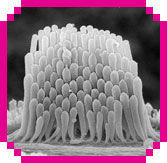From the first moments of life, our rapidly developing brain is shaped by a profusion of sights, sounds, and other sensations. Sensory perception is the foundation of face recognition, motor coordination, language fluency, and other abilities that we must acquire in order to thrive. For scientists who study the brain, the sensory systems serve as windows to understanding how children learn.
Explore the fundamental biology of perception with renowned sensory neuroscientist A. James Hudspeth at this year's Talking Science event. Focusing on human vision as well as hearing – his primary field of expertise – Dr. Hudspeth will provide an introduction to the principles of neural signaling and development. He will explain how sensory information is encoded and transmitted to the brain. He will also invite you to consider the brain's most remarkable feature, its plasticity, which allows continuing adjustments in its operations that permit learning during childhood and throughout life.
 Research in Dr. Hudspeth's laboratory at The Rockefeller University is shedding light on the neural mechanisms of normal hearing. His investigations are also showing how exposure to loud sounds damages the ear's sensory receptors at the cellular and molecular levels. This work is particularly timely in light of recent reports that American teenagers are now experiencing much higher rates of hearing impairment. Current research in the Hudspeth laboratory is aimed at identifying and controlling stem cells that can regenerate the ear's sensory receptors.
Research in Dr. Hudspeth's laboratory at The Rockefeller University is shedding light on the neural mechanisms of normal hearing. His investigations are also showing how exposure to loud sounds damages the ear's sensory receptors at the cellular and molecular levels. This work is particularly timely in light of recent reports that American teenagers are now experiencing much higher rates of hearing impairment. Current research in the Hudspeth laboratory is aimed at identifying and controlling stem cells that can regenerate the ear's sensory receptors.
A member of the National Academy of Sciences and an Investigator of Howard Hughes Medical Institute, Dr. Hudspeth directs the F. M. Kirby Center for Sensory Neuroscience, a consortium of Rockefeller University laboratories dedicated to research on sensory systems and the disorders that affect vision, hearing, balance, or the other senses. He has been recognized as an outstanding teacher by his colleagues at Rockefeller, Caltech, and other institutions where he has conducted research.